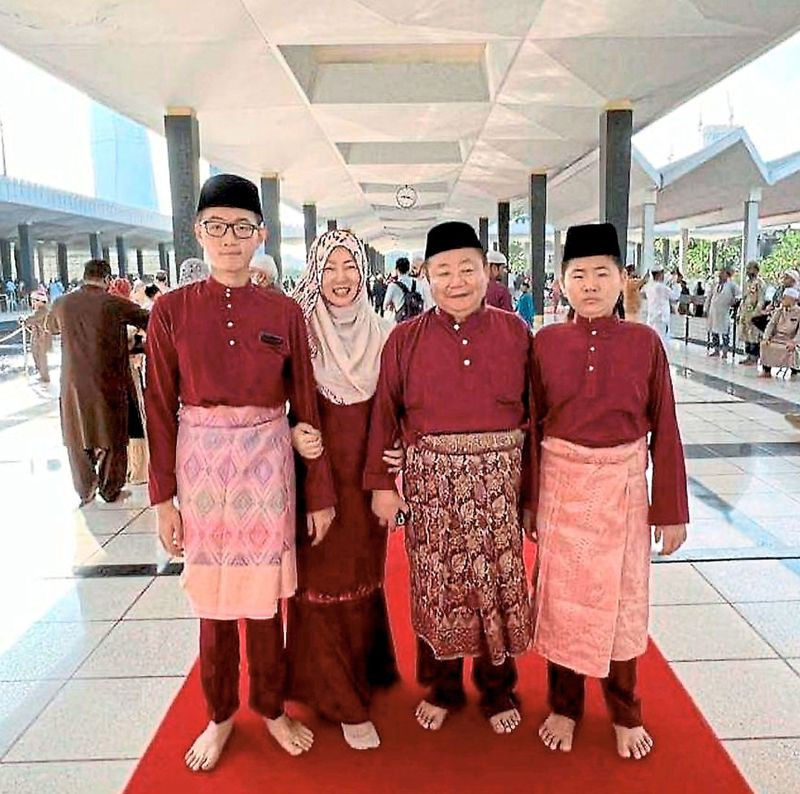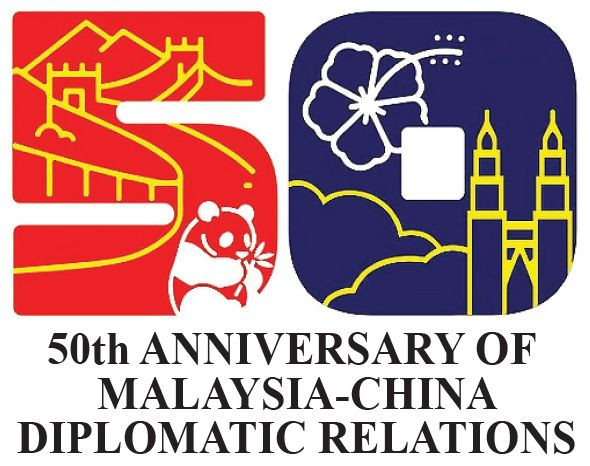- Joined
- Aug 20, 2022
- Messages
- 19,788
- Points
- 113
Chinese nationals who came, saw and conquered BM
By HO JIA WEN
Nation
Monday, 27 May 2024

A touch of Malaysia: Cui (second from right), his wife and two sons have adapted well to local culture.
PETALING JAYA: Ismail Nuh Cui Wei, a Chinese national from Lanzhou city, speaks Bahasa Malaysia so fluently that he is indistinguishable from a local.
It’s quite a feat as he did not know a single Malay word when he arrived in Malaysia in 1995. But he picked up the language within two years while he was a student in Terengganu.
“We had Malay tuition teachers. I went from zero to being completely fluent,” he said.
Furthermore, he would interact with his friends, who were mostly Malay.
Cui, 56, first came to learn Arabic at Universiti Sultan Zainal Abidin, where he later obtained a Master’s degree. Now, he can read, write and speak Arabic.

He is a Chinese Muslim of Hui ethnicity and founded the Al Amber Chinese Muslim restaurants serving Lanzhou cuisine in Kuala Lumpur.
And he is fascinated with Kelantan, too, but Terengganu remains special to him.
“I love going to Terengganu. The people are very friendly and down to earth,” he said.
He recalled fondly his student days celebrating Hari Raya with a host family.
“When I first came, I didn’t know anything about Hari Raya attire. I never had a songkok. My host family made a baju Melayu for me and taught me how to wear it,” he said.
He said the family even invited him to stay with them for a few days.
“I was very touched. I will never forget the kindness shown to me,” he said.
He keeps in touch with them to this day.
Malaysia, Cui said, is truly his second home.
His wife is also from Lanzhou but the couple decided to live in this country with their two children, aged 16 and 20, who grew up here.
“I feel close to the people here,” he said, attributing it to the similarity in culture with the Chinese community and the shared religion with the Malays.
“I never felt like a stranger or an outcast. Here, I feel like a Malaysian,” he said.
As for the 50 years of Malaysia-China diplomatic relations, Cui said he is proud of the close relationship between the countries.
“We are the direct beneficiaries because of the good ties. When Malaysians know that we are from China, there is so much warmth,” he said.
“I hope that this good relationship will continue for a long time,” he said.
Moving forward, Cui hoped to see more expansion of trade between the countries.
On the business side, Ni Qingjiu, who is the president of the China Enterprises Chamber of Commerce in Malaysia (CECCM), said many Chinese investors had their eyes set on Malaysia.
“We have received many groups from China who are interested to explore more opportunities in Malaysia.
“Malaysia is well known in China where it is viewed positively. There are many opportunities for collaboration in the future,” he added.
Ni, 55, said China has been Malaysia’s main trading partner and over the years, the ties had grown deeper especially in terms of foreign affairs and trade.
“I have high hopes for both countries and for more activities between the people, especially with the visa waiver,” said Ni.
(Malaysians going to China on business and tourism, family visits or transit purposes are allowed visa-free entry till December 2025 for trips up to 15 days. The Malaysian government has also permitted 30-day visa-free entry for Chinese citizens from Dec 1, 2023, to Dec 31, 2024.)
A Beijing native, Ni first came to Bintulu, Sarawak, in 2005 to be part of the Bakun dam project.
As the site was close to the forest, he took the opportunity to experience the natural greenery there.
“The environment is beautiful and better preserved because there are fewer people,” he said.
After almost two decades of living in Malaysia, Ni has much to share about his experience.
“I didn’t face too many obstacles with language, communication and culture,” he said.
Ni’s wife and their only child remain in Beijing, and he would go home to visit them.
As for Malaysia Chinese Restaurant association president-general Gao Haoyun, he feels equally at home in Malaysia.
A native of Jilin City in northeast China, Gao has lived in Malaysia for 17 years with his wife and two children.
“I have adapted to the way of life here. Living in Malaysia is an enriching experience. The people here are very friendly,” he said.
Being in the food industry, Gao, 42, has tried all sorts of cuisines.
“There are many unforgettable places and food for me, such as the unique street food, tropical fruits and seafood,” he said.
He is a proud advocate of Chinese cuisine in Malaysia.
“From what I see, more Malaysians are interested in trying Chinese cuisine,” he said.
His hope for the 50th anniversary of diplomatic ties between Malaysia and China is that both nations would continue to foster a meaningful friendship.
“I believe that with our combined efforts, we can resolve any differences and strengthen our mutual understanding and trust,” he said.
By HO JIA WEN
Nation
Monday, 27 May 2024

A touch of Malaysia: Cui (second from right), his wife and two sons have adapted well to local culture.
PETALING JAYA: Ismail Nuh Cui Wei, a Chinese national from Lanzhou city, speaks Bahasa Malaysia so fluently that he is indistinguishable from a local.
It’s quite a feat as he did not know a single Malay word when he arrived in Malaysia in 1995. But he picked up the language within two years while he was a student in Terengganu.
“We had Malay tuition teachers. I went from zero to being completely fluent,” he said.
Furthermore, he would interact with his friends, who were mostly Malay.
Cui, 56, first came to learn Arabic at Universiti Sultan Zainal Abidin, where he later obtained a Master’s degree. Now, he can read, write and speak Arabic.

He is a Chinese Muslim of Hui ethnicity and founded the Al Amber Chinese Muslim restaurants serving Lanzhou cuisine in Kuala Lumpur.
And he is fascinated with Kelantan, too, but Terengganu remains special to him.
“I love going to Terengganu. The people are very friendly and down to earth,” he said.
He recalled fondly his student days celebrating Hari Raya with a host family.
“When I first came, I didn’t know anything about Hari Raya attire. I never had a songkok. My host family made a baju Melayu for me and taught me how to wear it,” he said.
He said the family even invited him to stay with them for a few days.
“I was very touched. I will never forget the kindness shown to me,” he said.
He keeps in touch with them to this day.
Malaysia, Cui said, is truly his second home.
His wife is also from Lanzhou but the couple decided to live in this country with their two children, aged 16 and 20, who grew up here.
“I feel close to the people here,” he said, attributing it to the similarity in culture with the Chinese community and the shared religion with the Malays.
“I never felt like a stranger or an outcast. Here, I feel like a Malaysian,” he said.
As for the 50 years of Malaysia-China diplomatic relations, Cui said he is proud of the close relationship between the countries.
“We are the direct beneficiaries because of the good ties. When Malaysians know that we are from China, there is so much warmth,” he said.
“I hope that this good relationship will continue for a long time,” he said.
Moving forward, Cui hoped to see more expansion of trade between the countries.
On the business side, Ni Qingjiu, who is the president of the China Enterprises Chamber of Commerce in Malaysia (CECCM), said many Chinese investors had their eyes set on Malaysia.
“We have received many groups from China who are interested to explore more opportunities in Malaysia.
“Malaysia is well known in China where it is viewed positively. There are many opportunities for collaboration in the future,” he added.
Ni, 55, said China has been Malaysia’s main trading partner and over the years, the ties had grown deeper especially in terms of foreign affairs and trade.
“I have high hopes for both countries and for more activities between the people, especially with the visa waiver,” said Ni.
(Malaysians going to China on business and tourism, family visits or transit purposes are allowed visa-free entry till December 2025 for trips up to 15 days. The Malaysian government has also permitted 30-day visa-free entry for Chinese citizens from Dec 1, 2023, to Dec 31, 2024.)
A Beijing native, Ni first came to Bintulu, Sarawak, in 2005 to be part of the Bakun dam project.
As the site was close to the forest, he took the opportunity to experience the natural greenery there.
“The environment is beautiful and better preserved because there are fewer people,” he said.
After almost two decades of living in Malaysia, Ni has much to share about his experience.
“I didn’t face too many obstacles with language, communication and culture,” he said.
Ni’s wife and their only child remain in Beijing, and he would go home to visit them.
As for Malaysia Chinese Restaurant association president-general Gao Haoyun, he feels equally at home in Malaysia.
A native of Jilin City in northeast China, Gao has lived in Malaysia for 17 years with his wife and two children.
“I have adapted to the way of life here. Living in Malaysia is an enriching experience. The people here are very friendly,” he said.
Being in the food industry, Gao, 42, has tried all sorts of cuisines.
“There are many unforgettable places and food for me, such as the unique street food, tropical fruits and seafood,” he said.
He is a proud advocate of Chinese cuisine in Malaysia.
“From what I see, more Malaysians are interested in trying Chinese cuisine,” he said.
His hope for the 50th anniversary of diplomatic ties between Malaysia and China is that both nations would continue to foster a meaningful friendship.
“I believe that with our combined efforts, we can resolve any differences and strengthen our mutual understanding and trust,” he said.
